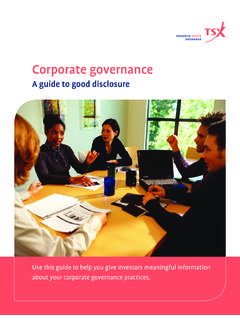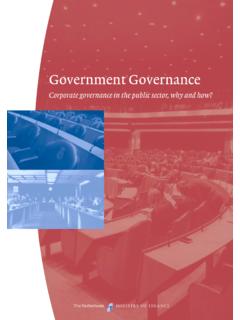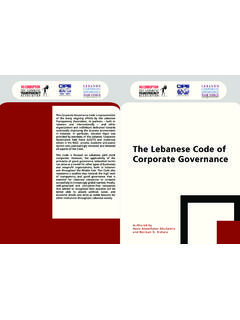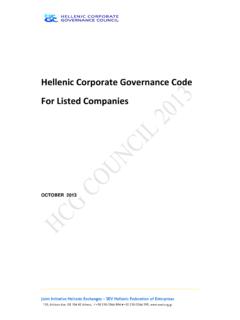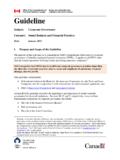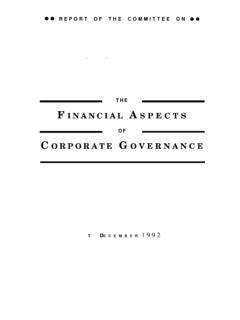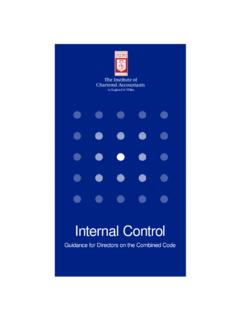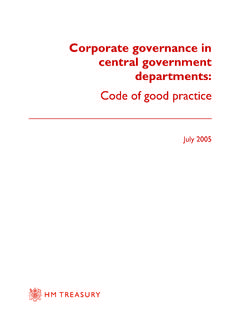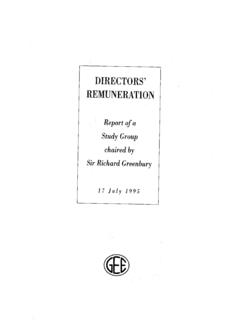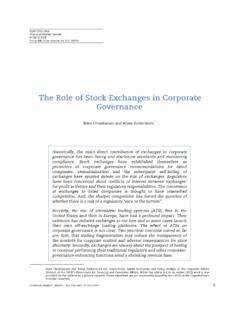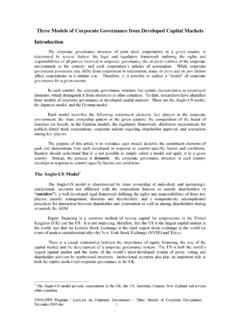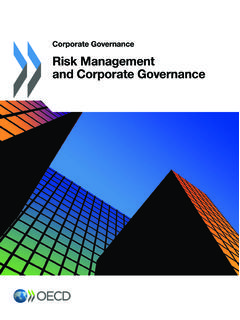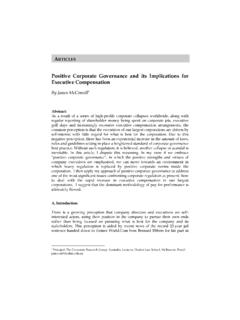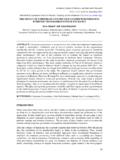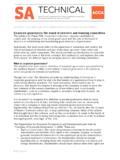Transcription of KING CODE OF GOVERNANCE FOR SOUTH AFRICA 2009
1 king code OF GOVERNANCEFOR SOUTH AFRICA 20091 2009 Institute of Directors in Southern AFRICA . All rights reservedACKNOWLEDGMENTSThe Institute of Directors in Southern AFRICA and the king Committee on GOVERNANCE acknowledge with appreciation the following endorsers of the king Report on GOVERNANCE for SOUTH AFRICA EngelbrechtChief ExecutiveInstitute of Directors2 2009 Institute of Directors in Southern AFRICA . All rights reservedACKNOWLEDGMENTSThe Institute of Directors in Southern AFRICA and the king Committee on GOVERNANCE acknowledge with appreciation the following associates and supporting bodies of the king Report on GOVERNANCE for SOUTH AFRICA bodies:1. Chartered Secretaries SOUTH AFRICA 2. Companies and Intellectual Property Registration Office 3. Compliance Institute of SOUTH Africa4. Direct Marketing Association of SOUTH AFRICA 5. Ethics Institute of SOUTH AFRICA 6. Independent Regulatory Board for Auditors 7. Institute of Internal Auditors (SA) 8. JSE Limited 9.
2 Securities Regulation Panel 10. SOUTH African Chamber of Commerce and Industry 11. SOUTH African Institute of Chartered Accountants 12. SOUTH African Institute of Professional Accountants 13. University of Pretoria : Centre for Responsible LeadershipAssociates:3 2009 Institute of Directors in Southern AFRICA . All rights reservedCOPYRIGHTINSTITUTE OF DIRECTORS IN SOUTHERN AFRICAThe Institute of Directors in Southern AFRICA owns the copyright in this publication titled king Report on GOVERNANCE for SOUTH AFRICA , and the king code of GOVERNANCE Principles ( king III). Apart from the extent reasonably necessary for research, private study, personal or private use, criticism, review or the reporting of current events as permitted in the Copyright Act (No. 98 of 1978), no portion of this publication may be repro-duced by any process without written permission and acknowledgment of Practice Notes supporting the Report and the code are available from the Institute of Directors in Southern Institute of Directors in Southern AFRICA and the king Committee on GOVERNANCE acknowledge with appreciation the contribution of Simplified for editing the king Report on GOVERNANCE for SOUTH AFRICA 2009 Institute of Directors in Southern AFRICA .
3 All rights reservedINTRODUCTION AND BACKGROUND1. The need for king IIIThe third report on corporate GOVERNANCE in SOUTH AFRICA became necessary because of the new Companies Act no. 71 of 2008 ( the Act ) and changes in international GOVERNANCE trends. This Report, referred to as king III, was compiled by the king Committee with the help of the king have endeavoured, as with king I and king II, to be at the forefront of GOVERNANCE internationally. We believe this has been achieved because of the focus on the importance of conducting business reporting annually in an integrated manner putting the financial results in perspective by also reporting on: > how a company has, both positively and negatively, impacted on the economic life of the community in which it operated during the year under review; and> how the company intends to enhance those positive aspects and eradicate or ameliorate the negative aspects in the year ahead. 2. Composition of the king Committee for king IIIOn the advice of Sir Adrian Cadbury, the king Committee has been retained even though only three members of the committee, formed in 1992, remain on the present king Committee.
4 In giving his advice, Sir Adrian Cadbury pointed out the evolutionary nature of corporate GOVERNANCE - various commissions were held in England under people other than Sir Adrian Cadbury after the Cadbury Report was issued. Following the Cadbury Report, the Greenbury, Hampel, Turnbull, Smith and Higgs Reports were issued. These were combined and the UK GOVERNANCE code is now known as the Com-bined code . Following Sir Adrian s advice, the committee in SOUTH AFRICA continues to be known as the king Committee and the king code has become an internationally recognised subcommittees were established for the king III process, namely: boards and directors; accounting and auditing; risk management; internal audit; integrated sustainability reporting; compliance and stakeholder relationships; business rescue; fundamental and affected transactions; IT GOVERNANCE ; alternative dispute resolution; and editing. Six researchers surveyed international best practices and helped to prepare the Practice Notes.
5 The subcommittees con-sisted of 106 people. Lindie Engelbrecht, Chief Executive of the Institute of Directors of Southern AFRICA (IoD), acted as the convener of the chairmen of the subcommittees. Michael Katz checked all the legal aspects contained in the names of the conveners and the members of the subcommittees are given in an attachment to this Report. Of the 123 people involved in this Report less than 20% are serving directors and the others are professionals and experts in the field of their and background5 2009 Institute of Directors in Southern AFRICA . All rights reservedAs with king I and II, none of the members received remuneration or reimbursement of expenses. The only value driver for members was service in the best interest of corporate SOUTH The GOVERNANCE compliance frameworkLegislated basis for GOVERNANCE complianceThe GOVERNANCE of corporations can be on a statutory basis, or as a code of principles and practices, or a combination of the two. The United States of America has chosen to codify a significant part of its GOVERNANCE in an act of Congress known as the Sarbanes-Oxley Act (SOX).
6 This statutory regime is known as comply or else . In other words, there are legal sanctions for non-compliance. There is an important argument against the comply or else regime: a one size fits all approach cannot logically be suitable because the types of business carried out by companies vary to such a large degree. The cost of compliance is burdensome, measured both in terms of time and direct cost. Further, the danger is that the board and management may become focused on compliance at the expense of enterprise. It is the duty of the board of a trading enterprise to undertake a measure of risk for reward and to try to improve the economic value of a company. If the board has a focus on compliance, the attention on its ultimate responsibility, namely performance, may be total cost to the American economy of complying with SOX is considered to amount to more than the total write-off of Enron, World Com and Tyco combined. Some argue that companies compliant with SOX are more highly valued and that perhaps another Enron debacle has been avoided.
7 Prof Romano of Yale Law School said, SOX s corporate GOVERNANCE provisions were ill-conceived. Other nations, such as the members of the European Union who have been revising their corporation codes, would be well advised to avoid Congress policy blunder. Prof Ribstein of Illinois Law School said, It is unlikely that hasty, crash-induced regulation like SOX can be far sighted enough to protect against future problems, par-ticularly in light of the debatable efficiency of SOX s response to current market problems. Even the best regulators might err and enact regulation that is so strong that it stifles innovation and entrepreneurial activity. And once set in motion, regulation is almost impossible to eliminate. In short, the first three years of SOX was, at best, an overreaction to Enron and related problems and, at worst, ineffective and unnecessary. Voluntary basis for GOVERNANCE complianceThe 56 countries in the Commonwealth, including SOUTH AFRICA and the 27 states in the EU including the United Kingdom, have opted for a code of principles and practices on a comply or explain basis, in addition to certain GOVERNANCE issues that are the United Nations, the question whether the United Nations GOVERNANCE code should be comply or explain or com-ply or else , was hotly debated.
8 The representatives of several of the world bodies were opposed to the word comply , because it connoted that there had to be adherence and there was no room for flexibility. Following king II, the Johannesburg Stock Exchange Limited (JSE) required listed companies to include in their annual report a narrative statement as to how they had complied with the principles set out in king II, providing explanations that Introduction and background6 2009 Institute of Directors in Southern AFRICA . All rights reservedfollowed practices recommended but have explained the practice adopted and have prospered. In these examples, the board ensured that acting in the best interests of the company was the overriding factor, subject always to proper consid-eration of the legitimate interests and expectations of all the company s stakeholders. SOUTH African listed companies are regarded by foreign institutional investors as being among the best governed in the world s emerging economies and we must strive to maintain that high ranking.
9 SOUTH AFRICA has benefited enormously from its listed companies following good GOVERNANCE principles and practices, as was evidenced by the significant capital inflows into SOUTH AFRICA before the global financial crisis of all these reasons, the king Committee continues to believe that there should be a code of principles and practices on a non-legislated approaches to voluntary basis for GOVERNANCE complianceInternationally, the comply or explain principle has also evolved into different approaches. At the United Nations, for instance, it was ultimately agreed that the UN code should be on an adopt or explain basis. In the Netherland code the apply or explain approach was adopted. We believe that this language more appropriately conveys the intent of the king code from inception rather than comply or explain . The comply or explain approach could denote a mindless response to the king code and its recommendations whereas the apply or explain regime shows an appreciation for the fact that it is often not a case of whether to comply or not, but rather to consider how the principles and recommendations can be applied.
10 king III, therefore, is on an apply or explain basis and its practical execution should be addressed as follows:It is the legal duty of directors to act in the best interests of the company. In following the apply or explain approach, the board of directors, in its collective decision-making, could conclude that to follow a recommendation would not, in the particular circumstances, be in the best interests of the company. The board could decide to apply the recommendation differently or apply another practice and still achieve the objective of the overarching corporate GOVERNANCE principles of fairness, accountability, responsibility and transparency. Explaining how the principles and recommendations were ap-plied, or if not applied, the reasons, results in compliance. In reality, the ultimate compliance officer is not the company s compliance officer or a bureaucrat ensuring compliance with statutory provisions, but the stakeholders. 4. The link between GOVERNANCE principles and lawThere is always a link between good GOVERNANCE and compliance with law.
